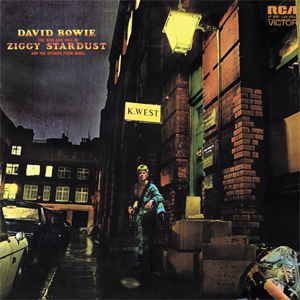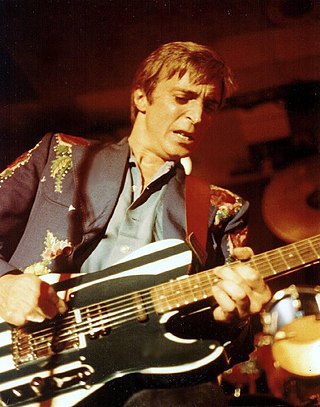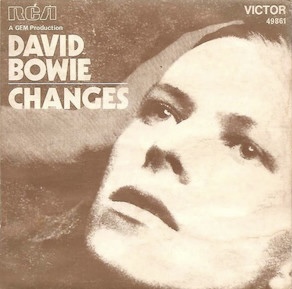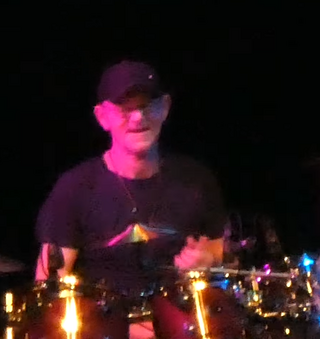Band members
Primary lineup
Later Members
Touring musicians
|
Timeline

Spiders from Mars | |
|---|---|
| Genres | |
| Years active | 1970–1973, 1975–1976 |
| Labels | Castle Music Ltd. |
| Past members | Mick Ronson Trevor Bolder Mick Woodmansey Mike Garson Dave Black Pete McDonald Aynsley Dunbar |
The Spiders from Mars were rock singer David Bowie's backing band in the early 1970s, and initially consisted of Mick Ronson on guitars, Trevor Bolder on bass guitar, and Mick Woodmansey on drums. [2]
The group had its origins in Bowie's earlier backing outfit the Hype, which featured Ronson and Woodmansey, but Tony Visconti on bass. They were briefly signed as a band on its own, known as Ronno. With Bolder taking over bass, they were subsequently named via the landmark 1972 Bowie concept album, The Rise and Fall of Ziggy Stardust and the Spiders from Mars , and were billed as such on the accompanying large-scale Ziggy Stardust Tour. Bowie had originally wanted keyboardist Rick Wakeman, then a member of the Strawbs, to join the band, having played on Bowie's second album and on Hunky Dory ; Wakeman declined and instead joined the progressive rock band Yes. [3] Wakeman would feature uncredited on the album, and would collaborate with Bowie again on "Absolute Beginners".
The band would move through a series of keyboard players culminating in Mike Garson. The Spiders from Mars were present again on Bowie's 1973 album, Aladdin Sane . Another leg of the tour followed that year, with the final show captured in the film, Ziggy Stardust and the Spiders from Mars . [4] With Aynsley Dunbar replacing Woodmansey, the band made the 1980 Floor Show in late 1973. This line-up also recorded the album Pin Ups . After Ronson and Bolder also moved on Bowie, Garson and Dunbar recorded Diamond Dogs . These latter two albums both still depicted Bowie as the Ziggy Stardust character on the sleeve.
The group joined Bowie's stage persona, Ziggy Stardust, in the theatrical style of the material's presentation. Ronson's guitar and arranging during the Spiders from Mars era not only fitted into this style, but also provided much of the underpinning for later punk rock musicians. [5]
In 1975, Bolder and Woodmansey reformed the band without Ronson, and were joined in this lineup by Mike Garson, Dave Black, and Pete McDonald. Their self-titled album, released in 1976, was their only album before the group disbanded.
The band's name came from the UFO sighting on 27 October 1954, where a stadium crowd thought they had witnessed Martian spacecraft which cast off a thin filament material, later hypothesised to be webs from migrating spiders. The band's name did not come, as sometimes believed by Bowie fans, from the Martian aerographic features often labelled as 'spiders' and 'baby spiders'. [6]
Primary lineup
Later Members
Touring musicians
|


The Rise and Fall of Ziggy Stardust and the Spiders from Mars is the fifth studio album by the English musician David Bowie, released on 16 June 1972 in the United Kingdom through RCA Records. It was co-produced by Bowie and Ken Scott and features Bowie's backing band the Spiders from Mars — Mick Ronson (guitar), Trevor Bolder (bass) and Mick Woodmansey (drums). It was recorded from November 1971 to February 1972 at Trident Studios in London.

Michael Ronson was an English musician, songwriter, arranger, and producer. He achieved critical and commercial success working with David Bowie as the guitarist of the Spiders from Mars. He was a session musician who recorded five studio albums with Bowie followed by four with Ian Hunter, and also worked as a sideman in touring bands with Van Morrison and Bob Dylan. A classically trained musician, Ronson was known for his melodic approach to guitar playing.

Aladdin Sane is the sixth studio album by the English musician David Bowie, released in the United Kingdom on 19 April 1973 through RCA Records. The follow-up to his breakthrough The Rise and Fall of Ziggy Stardust and the Spiders from Mars, it was the first album he wrote and released from a position of stardom. It was co-produced by Bowie and Ken Scott and features contributions from Bowie's backing band the Spiders from Mars — Mick Ronson, Trevor Bolder and Mick Woodmansey — with the pianist Mike Garson, two saxophonists and three backing vocalists. Recorded in London and New York City between legs of the Ziggy Stardust Tour, the record was Bowie's final album with the full Spiders lineup.

Hunky Dory is the fourth studio album by the English musician David Bowie, released in the United Kingdom on 17 December 1971 through RCA Records. Following a break from touring and recording, Bowie settled down to write new songs, composing on piano rather than guitar as in earlier works. Bowie assembled the guitarist Mick Ronson, the bassist Trevor Bolder, and the drummer Mick Woodmansey, and began to record a new album in mid-1971 at Trident Studios in London. Rick Wakeman contributed piano shortly before joining Yes. Bowie co-produced the album with Ken Scott, who had engineered Bowie's previous two records.

"Life on Mars?" is a song by the English singer-songwriter David Bowie, first released on his 1971 album Hunky Dory. Bowie wrote the song as a parody of Frank Sinatra's "My Way". "Life on Mars?" was recorded on 6 August 1971 at Trident Studios in London, and was co-produced by Bowie and Ken Scott. Bowie's backing band consisted of guitarist and string arranger Mick Ronson, bassist Trevor Bolder, drummer Mick Woodmansey and Strawbs member Rick Wakeman on piano. "Life on Mars?" is primarily a glam rock ballad, with elements of cabaret and art rock; it has a complex structure that includes chord changes throughout. The lyrics are about a girl who goes to a cinema to escape reality, and include surreal images that reflect optimism and the effects of Hollywood.

"Suffragette City" is a song by the English singer-songwriter David Bowie. It was originally released in April 1972 as the B-side of the single "Starman" and subsequently appeared on his fifth studio album The Rise and Fall of Ziggy Stardust and the Spiders from Mars (1972). The song was later reissued as a single in 1976, with the US single edit of "Stay" as the B-side, to promote the compilation album Changesonebowie in the UK. Co-produced by Bowie and Ken Scott, it was recorded by Bowie at Trident Studios in London with his backing band the Spiders from Mars, consisting of Mick Ronson, Trevor Bolder and Mick Woodmansey, at a late stage of the album's sessions. The song was originally offered to English band Mott the Hoople, who declined it and recorded Bowie's "All the Young Dudes" instead. It is a glam rock song that is influenced by the music of Little Richard and the Velvet Underground. The lyrics include a reference to Anthony Burgess' novel A Clockwork Orange and the lyric "Oooohh wham bam, thank you, ma'am".

"Changes" is a song by the English singer-songwriter David Bowie from his 1971 album Hunky Dory. RCA Records then released it as a single from the album on 7 January 1972. Written following his promotional tour of America in early 1971, "Changes" was recorded at Trident Studios in London between June and July that year. Co-produced by Bowie and Ken Scott, it featured Rick Wakeman on piano and the musicians who would later become known as the Spiders from Mars—Mick Ronson, Trevor Bolder and Mick Woodmansey.
Aladdin Sane (1913–1938–197?) is a song by the English singer-songwriter David Bowie, the title track from his 1973 album Aladdin Sane. Described by biographer David Buckley as the album's "pivotal" song, it saw Bowie moving into more experimental musical styles following the success of his breakthrough glam rock release The Rise and Fall of Ziggy Stardust and the Spiders from Mars in 1972.

Trevor Bolder was an English rock musician, songwriter and record producer. He is best known for his long association with Uriah Heep and his tenure with the Spiders from Mars, the backing band for David Bowie, although he also played alongside a variety of musicians from the early 1970s.

Michael "Woody" Woodmansey is an English rock drummer best known for his work in the early 1970s as a member of David Bowie's core backing ensemble that became known as the Spiders from Mars in conjunction with the release of Bowie's 1972 LP The Rise and Fall of Ziggy Stardust and the Spiders from Mars. With the death of Bowie in January 2016, Woodmansey became the last surviving member of the Spiders.

"Queen Bitch" is a song by the English singer-songwriter David Bowie. It was originally released on his 1971 album Hunky Dory before appearing as the B-side of the single "Rebel Rebel" in the United Kingdom in early 1974. Co-produced by Bowie and Ken Scott, the lineup consisted of the musicians who would later become known as the Spiders from Mars: Mick Ronson, Trevor Bolder and Mick Woodmansey.
"Lady Stardust" is a song written by the English singer-songwriter David Bowie that appeared on the album The Rise and Fall of Ziggy Stardust and the Spiders from Mars (1972). Co-produced by Ken Scott, Bowie recorded it with his backing band the Spiders from Mars – comprising Mick Ronson, Trevor Bolder and Mick Woodmansey. The song is generally interpreted as alluding to fellow glam rock icon Marc Bolan. The original demo version was entitled "He Was Alright ". A 4-track demo version of the song was sold as a picture disc single during the "David Bowie Is" exhibition in Japan in 2017.

"Velvet Goldmine" is a song by the English singer-songwriter David Bowie. A glam rock number with lyrical references to oral sex, it was originally recorded on 11 November 1971 at Trident Studios in London during the sessions for his 1972 album The Rise and Fall of Ziggy Stardust and the Spiders from Mars. It was ultimately left off the album and subsequently released as a B-side of the UK re-release of "Space Oddity" in 1975. Praised by biographers as an undervalued classic, it later appeared on compilation albums, including on Re:Call 1, part of the Five Years (1969–1973) boxed set, in 2015. Its namesake was used for Todd Haynes's 1998 film of the same name.
"Watch That Man" is a song by the English musician David Bowie, the opening track on the album Aladdin Sane from 1973. Its style is often compared to the Rolling Stones' Exile on Main Street. The mix, in which Bowie's lead vocal is buried within the instrumental sections, has generated discussion among critics and fans.
"Cracked Actor" is a song by the English musician David Bowie, released on his sixth studio album Aladdin Sane (1973). The track was also issued as a single in Eastern Europe by RCA Records in June that year. The song was written during Bowie's stay in Los Angeles during the American leg of the Ziggy Stardust Tour in October 1972. Co-produced by Bowie and Ken Scott, it was recorded in January 1973 at Trident Studios in London with his backing band the Spiders from Mars – comprising Mick Ronson, Trevor Bolder and Woody Woodmansey. A hard rock song primarily led by guitar, the song describes an aging Hollywood star's encounter with a prostitute, featuring many allusions to sex and drugs.
"Lady Grinning Soul" is a song by the English musician David Bowie, released on the album Aladdin Sane in 1973. It was a last-minute addition, replacing the "sax version" of "John, I'm Only Dancing" as the closing track. The composer's first meeting with American soul singer Claudia Lennear in 1972 is often cited as the inspiration for the song. In 2016, after Bowie's death, an interview with Lennear revealed that Bowie called her in 2014, and told her the song had been written about her.
Santa Monica '72 is a live album by David Bowie, recorded at Santa Monica Civic Auditorium on 20 October 1972 during the Ziggy Stardust Tour. Taken from KMET FM's radio broadcast, it was available only as a bootleg for more than 20 years; according to author David Buckley, possessing a copy was the test of a "proper Bowie fan". The recording was issued semi-legally/officially and without Bowie's approval by the Golden Years label in 1994, with Griffin Music handling the American release in 1995.

Ziggy Stardust and the Spiders from Mars is a 1979 British documentary/concert film by D. A. Pennebaker. It features English singer-songwriter David Bowie and his backing group the Spiders from Mars performing at the Hammersmith Odeon in London on 3 July 1973, the final date of his Ziggy Stardust Tour. At this show, Bowie made the sudden surprise announcement that the show would be "the last show that we'll ever do", later understood to mean that he was retiring his Ziggy Stardust persona.

The Ziggy Stardust Tour was a 1972–73 concert tour by the English singer-songwriter David Bowie, to promote the studio albums Hunky Dory, The Rise and Fall of Ziggy Stardust and the Spiders from Mars and Aladdin Sane. Bowie was accompanied by his backing group, the Spiders from Mars, and integrated choreography, costumes and make-up into the live shows to make them a wider entertainment package. The tour generated significant press coverage, drawing positive reviews and launching Bowie to stardom.

"Soul Love" is a song by the English singer-songwriter David Bowie from his 1972 album The Rise and Fall of Ziggy Stardust and the Spiders from Mars. Co-produced by Bowie and Ken Scott, it features Bowie's backing band known as the Spiders from Mars – Mick Ronson, Trevor Bolder and Mick Woodmansey. It was recorded on 12 November 1971 at Trident Studios in London and features a saxophone solo from Bowie and a guitar solo from Ronson. Lyrically, the song is about numerous characters dealing with love before the impending disaster that will destroy Earth as described in the album's opening track "Five Years". Like most tracks on the album, the song was rewritten to fit the Ziggy Stardust narrative.